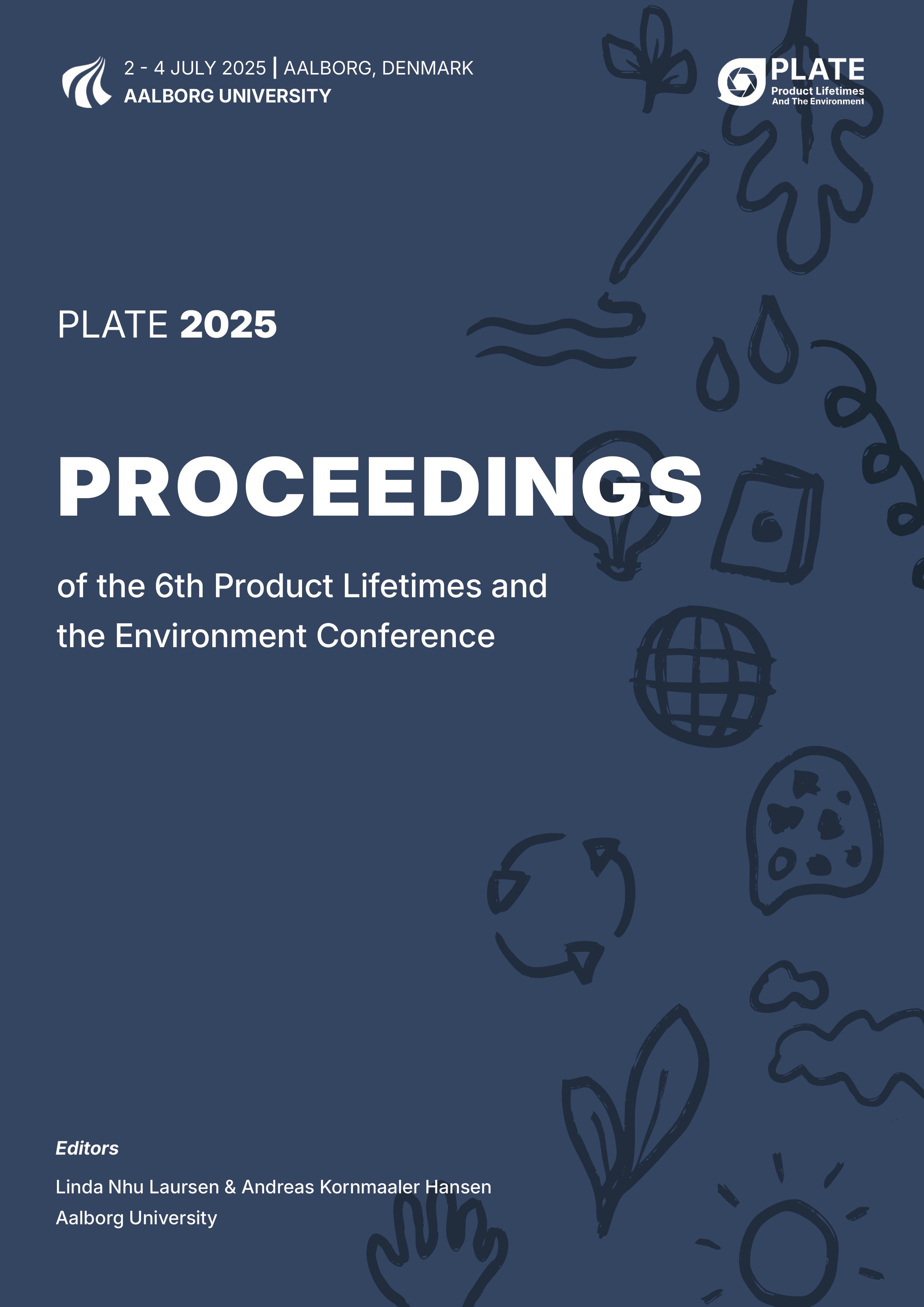Evaluating Ecodesign Methodology in Yacht Design
A Professional Workshop Case Study
DOI:
https://doi.org/10.54337/plate2025-10301Keywords:
Sustainability, Ecodesign, Yacht design, Life cycle designs, MPDSAbstract
The yachting industry faces increasing pressure to adopt sustainable practices driven by regulatory requirements and evolving consumer expectations. This study explores the application of Life Cycle Design (LCD), also referred to as ecodesign, methodologies within yacht design to address environmental challenges. Despite the critical importance of early-stage design in determining a product's environmental impact, the yacht sector lacks industry-specific sustainability guidelines.This research investigated the practical implementation of a generic LCD methodology - specifically the MPDS (Method for Product Design for Environmental Sustainability) - through an intensive workshop involving young professional yacht designers. Participants were tasked with developing concept designs for a 50-foot charter yacht, applying six LCD strategies: use extension, material consumption reduction, energy consumption reduction, material life extension, toxicity reduction, and resources conservation.The study outlined both opportunities and limitations in applying MPDS to yacht design. While participants achieved incremental improvements in certain strategies, the research highlighted the need for context-specific adaptations. Challenges included the methodology's generic nature and the complexity of yacht design processes.The findings underscore the potential of LCD principles in promoting sustainability within the nautical industry and provide a foundation for developing tailored guidelines that can effectively integrate environmental considerations into yacht design processes.
References
Ahmad, S., Wong, K.Y., Tseng, M.L., & Wong, W.P. (2018). Sustainable product design and development: A review of tools, applications and research prospects. Resources, Conservation and Recycling, 132, 49-61. https://doi.org/10.1016/j.resconrec.2018.01.020
Ansaloni, G.M.M., Bionda, A., & Ratti, A. (2024). The Evolution of Yacht: From Status-Symbol to Values’ Source. In: Zanella, F., et al. Multidisciplinary Aspects of Design. Design! OPEN 2022. Springer Series in Design and Innovation, vol 37. Springer, Cham. https://doi.org/10.1007/978-3-031-49811-4_17
Ceschin, F., & Gaziulusoy, I. (2021). Design for Sustainability: A Multi-level Framework from Products to Socio-technical Systems (1st ed.). Routledge. https://doi.org/10.4324/9780429456510
Chaves, L.I. (2008). Design for sustainability: A methodological approach for the introduction of environmental requirements in the furniture sector. Product: Management & Development, 6(2), 167–171.
Dahmani, N., Benhida, K., Belhadi, A., Kamble, S., Elfezazi, S., & Jauhar, S.K. (2021). Smart circular product design strategies towards eco-effective production systems: A lean eco-design industry 4.0 framework. Journal of Cleaner Production, 320, Article 128847. https://doi.org/10.1016/j.jclepro.2021.128847
Directorate-General for Communication (European Commission) (2020). Circular economy action plan: For a cleaner and more competitive Europe. Publications Office of the European Union. https://data.europa.eu/doi/10.2779/05068
Hauschild, M.Z., Rosenbaum, R.K., & Olsen, S. I. (2018). Life Cycle Assessment: Theory and Practice. Springer. https://doi.org/10.1007/978-3-319-56475-3
Hobday, M. (1998). Product complexity, innovation and industrial organisation. Research policy, 26(6), 689-710.
International Maritime Organization (2023). 2023 IMO strategy on reduction of GHG emissions from ships. https://www.imo.org/en/OurWork/Environment/Pages/2023-IMO-Strategy-on-Reduction-of-GHG-Emissions-from-Ships.aspx
International Organization for Standardization. (2020). Environmental management systems — Guidelines for incorporating ecodesign (ISO Standard No. 14006:2020). https://www.iso.org/standard/72644.html
Jacquet, L., le Duigou, A., & Kerbrat, O. (2024). A systematic literature review on holistic lifecycle assessments as a basis to create a standard in maritime industry. Int J Life Cycle Assess 29, 683–705. https://doi.org/10.1007/s11367-023-02269-4
Legge regionale 21 giugno 2021, n. 13, “Riconoscimento dell'albergo nautico diffuso, modifiche alla legge regionale n. 16 del 2017.” (2021). Bollettino Ufficiale della Regione Autonoma della Sardegna (BURAS), n. 37, Parte Prima. https://buras.regione.sardegna.it/custom/frontend/viewInsertion.xhtml?insertionId=e1881fdd-d2f6-4be0-b62d-3e98f27b4b11
Liang, M., & Birmingham, R. (2024). Identification of technologies and processes to enhance the sustainable design, manufacture, operation, and end-of-life of the motor yacht above 24 meters. Proceedings of the International Conference on Design and Construction of Super and Mega Yachts 2019, Italy. https://doi.org/10.3940/rina.smy.2019.18
Montigneaux, R., & Mower, M. (2023). Global Order Book: Full Analysis of Yachts on Order in 2024. BOAT International. https://www.boatinternational.com/boat-pro/global-order-book/global-order-book-2024-report
Paris Agreement (2016). Official Journal, L 282, 4-18. CELEX: https://eur-lex.europa.eu/legal-content/EN/TXT/?uri=CELEX:22016A1019(01)
Plaschke, L., Vezzoli, C., & Scullica, F. (2019). Product Design for Sustainability – Guidelines for the Life Cycle Design of Office Furniture. Proceedings of the 3. LeNS world distributed conference, Italy, Mexico, China, India, Brazil, South Africa, 3, 915-919. https://hdl.handle.net/11311/1122948
Stark, J. (2024). Product Lifecycle Management (Volume 6): Increasing the Value of PLM with Innovative New Technologies. Springer. https://doi.org/10.1007/978-3-031-53521-5
Vezzoli, C. (2018). Design for Environmental Sustainability: Life Cycle Design of Products (2nd ed.). Springer. https://doi.org/10.1007/978-1-4471-7364-9
Vezzoli, C., & Conti, G.M. (2019). Life Cycle Design (LCD) Guidelines for Environmentally Sustainable Clothing Care Systems: An Open and Operative Tool for Designers. Proceedings of the 3. LeNS world distributed conference, Italy, Mexico, China, India, Brazil, South Africa, 3, 859-864.
Yang, D., & Vezzoli, C. A. (2024). Designing Environmentally Sustainable Furniture Products: Furniture-Specific Life Cycle Design Guidelines and a Toolkit to Promote Environmental Performance. Sustainability, 16(7), 2628. https://doi.org/10.3390/su16072628
Yücenur, G.N. (2021). A Sequential Solution with MCDM Methods at the Motor-Yacht Construction Problem. Journal of ETA Maritime Science, 9(3), 177–191. https://doi.org/10.4274/jems.2021.8815




